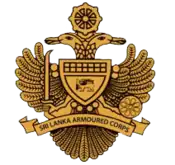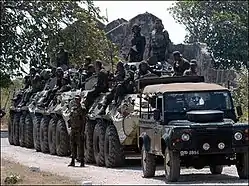Sri Lanka Armoured Corps
The Sri Lanka Armoured Corps (SLAC) provides the armour capability of the Sri Lanka Army, with vehicles such as the VT1A, T-55AM2, and ZTZ88 main battle tanks, the BMP infantry fighting vehicle and the BTR-80, and WZ551 armoured personnel carriers. It comprises six regular armoured regiments and a volunteer (reserve) regiment. It has an independent Armoured Brigade and is headquartered at Rock House Army Camp, Colombo.
| Sri Lanka Armoured Corps | |
|---|---|
 | |
| Active | 1955 - present |
| Country | |
| Branch | |
| Type | Armoured corps |
| Role | Tank warfare Armoured warfare |
| Size | 6 regular regiments, 1 volunteer regiment |
| Regimental Headquarters | Rock House |
| Motto(s) | Whither the fates call |
| March | Quick - The Radetski March (traditional) Under the Double Eagle (modern) Slow - 1st Dragoon Guards and 2nd Dragoon Guards Slow March |
| Engagements | 1971 Insurrection Insurrection 1987-89 Sri Lankan Civil War |
| Commanders | |
| Brigade Commandant | Brig M G T D Rathnasekara |
| Centre Commandant | Brig M S Devapriya |
| Notable commanders | General D. S. Attygalle LVO |
| Insignia | |
| Flag |  |
History
With formation of the Ceylon Army, a cavalry arm was considered and to this end the 1st Reconnaissance Squadron was established on October 10, 1955 under the command of Major (later General) D. S. Attygalle, LVO who would go on to become the commander of the Sri Lankan Army. With its expansion to a formation reconnaissance regiment in 1958, thus becoming the Ceylon Armoured Corps and the first armoured unit of the Ceylon Army. The 1st Reconnaissance Regiment became allied to and inherited the traditions of the Queen's Dragoons Guards of the British Army. The regimental headquarters was moved from Echelon Barracks to Rock House Army Camp in Colombo in 1957, which it still occupies.
The CAC was deployed on several occasions in the 1950s and 1960s on flood relief and internal security operations. It was deployed for combat operations during the 1971 Insurrection against the JVP first in Kurunegala and thereafter in Anuradhapura. When Sri Lanka became a republic in 1972, the CAC became the Sri Lanka Armoured Corps.
Since the 1980s with escalation of the Sri Lankan civil war the SLAC has taken part in almost all the major combat operations in the northern and eastern provinces of the country as well as being stationed in the southern parts of the country. To meet the threat of terrorism the SLAC increased its strength of both personnel and armoured vehicles. This resulted in the Armoured Brigade being raised, in 1988 under the command of Brigadier (later Major General) Y. Balaretnarajah, USP who became the first Armoured Brigade Commander, he would later become Chief of Staff of the Sri Lanka Army. The other components of the armoured Brigade, namely the 3rd Reconnaissance Regiment was raised in 1988 (converted to the 3rd Armoured Regiment in 2009), the first tank regiment, the 4th Armoured Regiment was raised in 1991 followed by the 5th Regiment raised in 1994 and four reinforcement regiments were formed in 1997, 1998 and 2008. The commander of the armoured brigade/director armour is always an officer of armoured corps holding the rank of Brigadier.
The first volunteer (reserve) unit of the SLAC, the 2nd Regiment, Sri Lanka Armoured Corps was formed in 1979 under the command of Lt. Col Eustace Jayasekara with troops from the Ceylon National Guard. It was redesignate in 1989, as the 5th (Volunteer) battalion, Sri Lanka Light Infantry. However a new volunteer unit, the 7th(v) Sri Lanka Armoured Corps has since been reformed.
In recent years the corps has developed its own assault troopers to provide close combat support in the form of mechanized infantry. It operates the army's armoured recovery vehicles and armoured vehicle-launched bridging units. In 1998 the SLAC was presented with the President's Standard in recognition of the service it has rendered. At present the SLAC has six regular regiments, one volunteer regiment and a regimental band.
Units
Regular regiments

- 1st Reconnaissance Regiment SLAC
- 3rd Armoured Regiment SLAC
- 4th Armoured Regiment SLAC
- 5th Reconnaissance Regiment SLAC
- 6th Regiment SLAC (RFT)
- 8th Regiment SLAC (RFT)
- Armoured Cops Training Centre
Volunteer regiments
- 7th(v) Sri Lanka Armoured Corps
Equipment
At its inception the 1st Recce Squadron was equipped with British Ferret Mk I Scout Cars[1] along with BSA M20 with side cars that were armed with LMGs. By the end of the 1950s BSA M21 motorcycles, Ferret Mk II Scout Cars and Daimler Armoured Cars where added to the Ceylon Armoured Corps.[1]
Following the 1971 Insurrection, British Alvis Saladin armoured cars and Soviet BTR-152 armored personnel carriers (APC) were added. With the start of the norther insurrection in 1980s, British Alvis Saracen APCs and Alvis Stalwarts amphibious vehicles were added.[1]
As the norther insurrection blew out into a full-scale civil war the Sri Lankan Army turned towards new sources of heavier weaponry such as the Soviet Union, Yugoslavia, China and the Czech Republic.
In 1991, Sri Lanka Armoured Corps received Chinese T-80 light tanks, Type 85 APCs, command vehicles and Type 84 armoured recovery vehicles. That year the SLAC introduced tanks for the first time in Sri Lankan Military history, deploying T-55 A medium tanks and T 55 ARVs brought down from the Czech Republic. In 1992, SLAC deployed Chinese Type 86 infantry fighting vehicles (IFV).
In 1994, Russian BMP-1 IFVs, followed by Chinese Type 63 II APCs and Czech T 54 AVLB bridge-layers were added in 1995. In 1998, BTR-80 APCs and BTR-80 A IFVs were added to the 'A' vehicle fleet.
In 2000, Czech T-55 AM II MBTs, BMP-2, BMP-3 IFVs were added followed by the BMP-2 command vehicles in 2002. In 2009 Chinese WZ551 APCs were added.
The APCs enabled the Armoured Corps to have their own assault troopers to provide close combat support.
|
|
|
|
Notable members
- General Deshamanya D. S. Attygalle, LVO, SLAC - former Commander of the Army, Permanent Secretary of the Ministry of Defence and father of the Sri Lanka Armoured Corps
- General Cyril Ranatunga, VSV, SLAC - former GOC, Joint Operations Command and Permanent Secretary of the Ministry of Defence
- General Jagath Jayasuriya, VSV, USP, psc, SLAC - former Chief of the Defence Staff and Commander of the Army
- General Rohan Daluwatte, RWP, RSP, VSV, USP, SLAC - Former Commander of the Army.
- General Cecil Waidyaratne, VSV, USP, ndc, psc SLAC - Former Commander of the Army.
- Lieutenant General Denzil Kobbekaduwa RWP, RSP, VSV, USP, rcds, psc, SLAC † - Former General Officer Commanding Northern Sector & one of the greatest generals in modern Sri Lanka.
- Major General Y. Balaretnarajah, VSV, USP,ndc, SLAC- Former Chief of Staff of the Army, Commandant Sri Lanka Army Volunteer Force, GOC, 1 Division and Commander, Security Forces, Jaffna.
- Major General DVSY Kulathunge USP, RSP, ndc, psc, SLAC- Former Chief of Staff of the Army and Cammandant Sri Lanka Army Volunteer Force.
- Major General G.A Chandrasiri RWP, USP, mdc, psc SLAC- Former Chief of Staff of the Army and Commander, Northern Command.
- Major General C.H. Fernando, VSV, SLAC - former Director Operations, General Staff; GOC, 2 Division; Commandant, Army Training Centre; Commander, Northern Command.
- Major General T Paranagama VSV, USP, SLAC - Former GOC, 1 Division, GOC, 3 Division; and Commander Security Forces Headquarters - Wanni (SF HQ (W)),
- Major General T. N. De Silva, USP, psc, SLAC - former Commandant, Sri Lanka Army Volunteer Force; GOC, 21 Division, Brigade Commander Armoured Brigade and Director, National Cadet Corps.
- Major General P.A Karunatilleke RWP- Former Deputy Overall Operations Commander and Commander Northern Command.
- Major General D. Kalupahana, RSP, USP, psc, SLAC - former GOC, 3 Division; GOC, 2 Division; Director Operations, General Staff and Commandant, Sri Lanka Military Academy.
- Major General N.A.Ranasinghe, RSP, VSV, USP, ndc, psc, Isc, SLAC - Former General Officer Commanding (GOC) 56 Division; Director Operations and Plans at the Joint Operations Headquarters, Commandant, Sri Lanka Military Academy, Commandant, Army Command and Staff College, Commandant, Defence Services Command and Staff College, First Commanding Officer of 5th Regiment, Sri Lanka Armoured Corps.
- Major General Nandana Udawatta, RSP, USP, SLAC - former Security Forces Headquarters – Mullaitivu (SFHQ-MLT) and former GOC, 59 Division[3]
- Major General Milinda Peiris, RWP, RSP, USP, ndc, psc - Vice Chancellor of the General Sir John Kotelawala Defence University (KDU).
- Major General Ubaya Madawela, USP, psc - Security Force Commander (West) and former Military Spokesman
- Brigadier Dennis Hapugalle, VSV, psc, SLAC - former Chief of Civil Defence and Permanent Secretary, Ministry of Internal Security.
- Brigadier M. H. Gunaratne, VSV, psc, SLAC - former Commander Security Forces Headquarters - East (SF HQ (E)), Commander, Task Force I and Task Force III and Commandant, Army Training Centre
- Brigadier R. M. Jayasinghe, USP, psc, SLAC - former Director Armour; brigade commander, armored brigade; brigade commander, 212 Brigade and the first Military attaché, Sri Lankan Embassy, Washington DC.
Alliances
Order of precedence
| Preceded by First in Order of Precedence |
Order of Precedence | Succeeded by Sri Lanka Artillery |
| Preceded by First in Order of Precedence |
Order of Precedence (with armoured vehicles) |
Succeeded by Mechanized Infantry Regiment |
See also
References
- Michael K. Cecil - Sri Lanka’s Military: The Search For A Mission, .
- "Type 63". nation.lk.
- Two Security Forces Headquarters established in Mullaitivu, Kilinochchi Archived 2011-09-16 at the Wayback Machine
